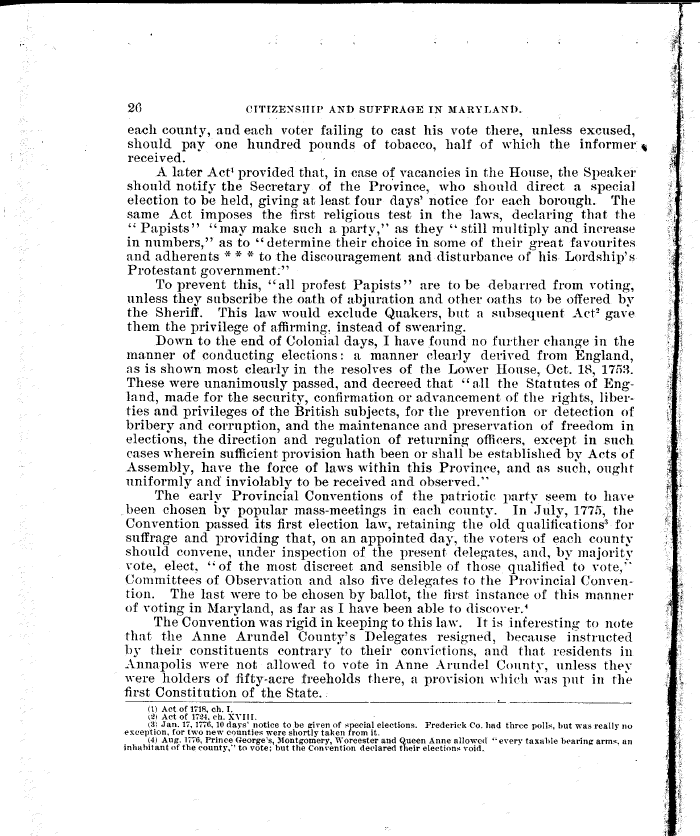|
2 6 CITIZENSHIP AND SUFFRAGE IN MARYLAND.
each county, and each voter failing to cast his vote there, unless excused,
should pay one hundred pounds of tobacco, half of which the informer
received.
A later Act' provided that, in case of vacancies in the house, the Speaker
should notify the Secretary of the Province, who should direct a special
election to be held, giving at least four days' notice for each borough. The
same Act imposes the first religious test in the laws, declaring that the
" Papists" "may make such a party," as they " still multiply and increase
in numbers," as to "determine their choice in some of their great favourites
and adherents ~ ~ ~ to the discouragement and disturbance of his. Lordship's
Protestant government:"
To prevent this, "all profest Papists" are to be debarred from voting,
unless they subscribe the oath of abjuration and other oaths to be offered
by
the Sheriff. This law would exclude Quakers, but a subsequent Act' gave
them the privilege of affirming, instead of s\\•ea,ring.
Down to the end of Colonial days, I have found no farther change in the
manner of conducting elections: a manner clearly derived from England,
as is shown most clearly in the resolves of the Lover Horse, Oct. 18, 17.53.
These were unanimously passed, and decreed that. `',III the Statutes of Eng-
land, made for the security, confirmation or advancement of the rights,
fiber-
ties and privileges of the British subjects, for the prevention or
detection of
bribery and corruption, and the maintenance and preservation of freedom in
elections, the direction and regulation of returning officers, except in
such
cases wherein sufficient provision bath been or shall be established by
Acts of
Assembly, have the force of laws within this Province, and as such, ought
uniformly and inviolably to be received and observed."
The early Provincial Conventions of the patriotic party seem to have
been chosen b y popular mass-meetings in each count-. In .Tiny, 177:1, the
Convention passed its first election law, retaining the old qualifications3
for
suffrage and providing that, on an appointed day, the voters of each county
should convene, under inspection of the present delegates, and, by majority
vote, elect, "of the most discreet and sensible of those qualified to vote,"
Committees of Observation and also five delenates to the Provincial Conven-
tion. The last were to be chosen by ballot, the first instance of this
manner
of voting in Maryland, as far as I have been able to discover.'
The Convention was rigid in beeping to this lave. It is inferestily to note
that the Anne Arundel County's Delegates resigned, because instructed
by their constituents contrary to their convictions, and that residents in
Annapolis were not allowed to vote in Anne Arundel County, unless they
were holders of fifty-acre freeholds there, a provision \vllicvh \\-as put
in the
first Constitution of the State. .
(1) Act of 1718, ch. I.
12) Act of 17:.>4, eh. x\-III.
X31 Jan. Ii, 177C,, 10 days' notice to he given of special elections.
Frederick Co. had three polls, but was really no
exception, for two new counties were shortly taken from it.
(4) An-. 1776, Prince George's, Montgomery, Worcester and 31'eIrAnne
allowed - every taxable hearing arms, an
inhabitant of the county," to vote; but the Convention declared ~1eir
elections void.
|

